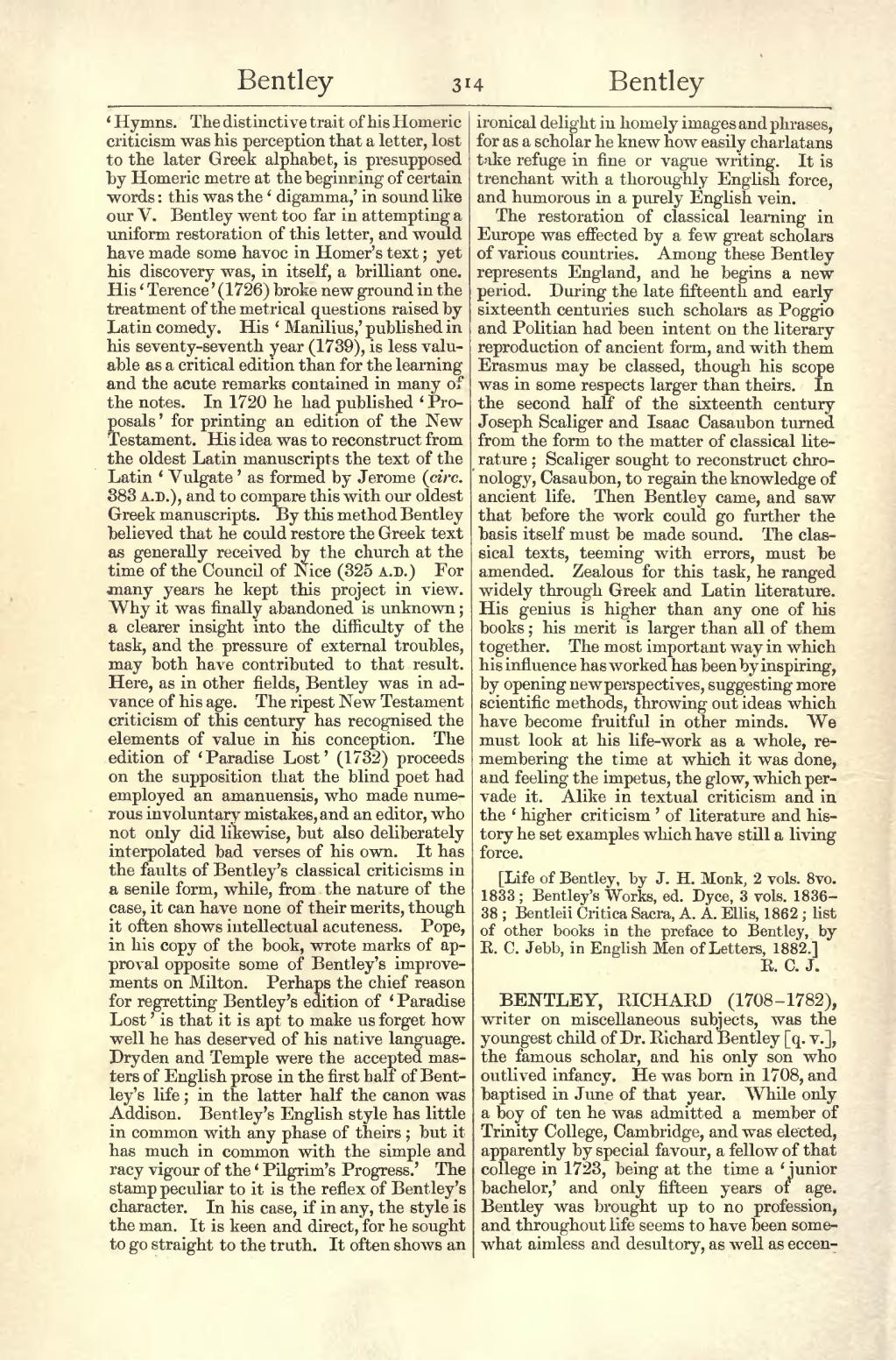'Hymns. The distinctive trait of his Homeric criticism was his perception that a letter, lost to the later Greek alphabet, is presupposed by Homeric metre at the beginning of certain words: this was the 'digamma,' in sound like our V. Bentley went too far in attempting a uniform restoration of this letter, and would have made some havoc in Homer's text; yet his discovery was, in itself, a brilliant one. His 'Terence' (1726) broke new ground in the treatment of the metrical questions raised by Latin comedy. His 'Manilius,' published in his seventy-seventh year (1739), is less valuable as a critical edition than for the learning and the acute remarks contained in many of the notes. In 1720 he had published 'Proposals' for printing an edition of the New Testament. His idea was to reconstruct from the oldest Latin manuscripts the text of the Latin 'Vulgate' as formed by Jerome (circ. 383. A.D.), and to compare this with our oldest Greek manuscripts. By this method Bentley believed that he could restore the Greek text as generally received by the church at the time of the Council of Nice (325 A.D.) For many years he kept this project in view. Why it was finally abandoned is unknown; a clearer insight into the difficulty of the task, and the pressure of external troubles, may both have contributed to that result. Here, as in other fields, Bentley was in advance of his time. The ripest New Testament criticism of this century has recognised the elements of value in his conception. The edition of 'Paradise Lost' (1732) proceeds on the supposition that the blind poet had employed an amanuensis, who made numerous involuntary mistakes, and an editor, who not only did likewise, but also deliberately interpolated bad verses of his own. It has the faults of Bentley's classical criticisms in a senile form, while, from the nature of the case, it can have none of their merits, though it often shows intellectual acuteness. Pope, in his copy of the book, wrote marks of approval opposite some of Bentley's improvements on Milton. Perhaps the chief reason for regretting Bentley's edition of 'Paradise Lost' is that it is apt to make us forget how well he has deserved of his native language. Dryden and Temple were the accepted masters of English prose in the first half of Bentley's life; in the latter half the canon was Addison. Bentley's English style has little in common with any phase of theirs: but it has much in common with the simple and racy vigour of the 'Pilgrim's Progress.' The stamp peculiar to it is the reflex of Bentley's character. In his case, if in any, the style is the man. It is keen and direct, for he sought to go straight to the truth. It often shows an ironical delight in homely images and phrases, for as a scholar he knew how easily charlatans take refuge in fine or vague writing. It is trenchant with a thoroughly English force, and humorous in a purely English vein.
The restoration of classical learning in Europe was effected by a few great scholars of various countries. Among these Bentley represents England, and he begins a new period. During the late fifteenth and early sixteenth centuries such scholars as Poggio and Politian had been intent on the literary reproduction of ancient form, and with them Erasmus may be classed, though his scope was in some respects larger than theirs. In the second half of the sixteenth century Joseph Scaliger and Isaac Casaubon turned from the form to the matter of classical literature: Scaliger sought to reconstruct chronology, Casaubon, to regain the knowledge of ancient life. Then Bentley came, and saw that before the work could go further the basis itself must be made sound. The classical texts, teeming with errors, must be amended. Zealous for this task, he ranged widely through Greek and Latin literature. His genius is higher than any one of his books; his merit is larger than all of them together. The most important way in which his influence has worked has been by inspiring, by opening new perspectives, suggesting more scientific methods, throwing out ideas which have become fruitful in other minds. We must look at his life-work as a whole, remaining the time at which it was done, and feeling the impetus, the glow, which pervade it. Alike in textual criticism and in the 'higher criticism' of literature and history he set examples which have still a living force.
[Life of Bentley, by J. H. Monk, 2 vols. 8vo. 1833; Bentley's Works, ed. Dyce, 3 vols. 1836-38; Bentleii Critica Sacra, A. A. Ellis, 1862; list of other books in the preface to Bentley, by R. C. Jebb in English Men of Letters, 1882.]
BENTLEY, RICHARD, (1708–1782) writer on miscellaneous subjects, was the youngest child of Dr. Richard Bentley [q. v.], the famous scholar, and his only son who outlived infancy. He was born in 1708, and baptised in June of that year. While only a boy of ten he was admitted a member of Trinity College, Cambridge, and was elected, apparently by special favour, a fellow of that college in 1728, being at the time a 'junior bachelor,' and only fifteen years of age. Bentley was brought up to no profession, and throughout life seems to have been somewhat aimless and desultory, as well as eccen-
